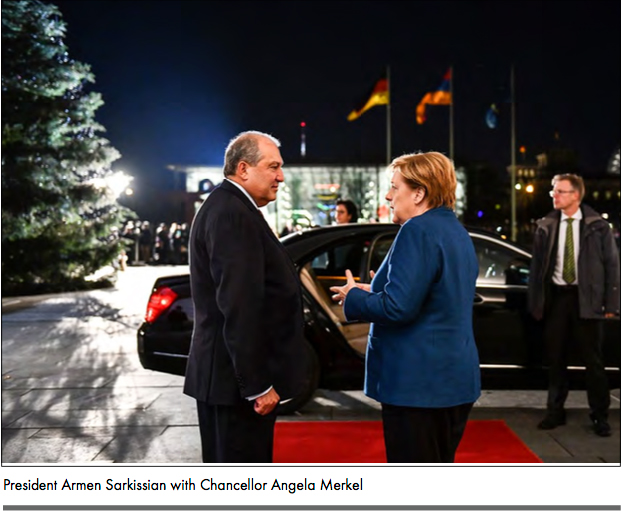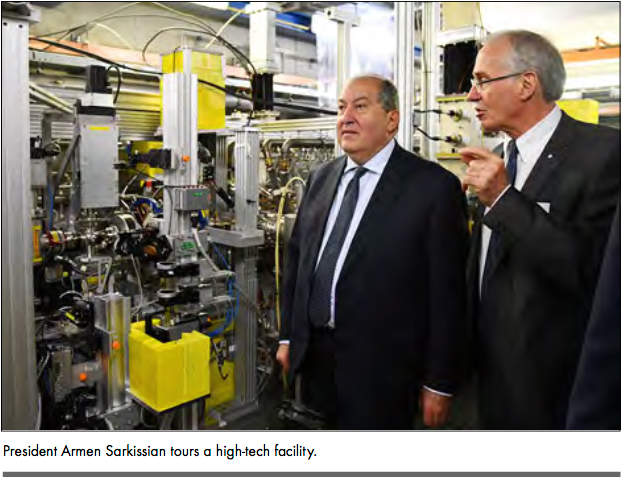A Good Time to Come to Berlin
Dec/07/2018 Archived in:Armenia

By Muriel Mirak-Weissbach – Special to the Mirror-Spectator
BERLIN — The visit of Armenian President Armen Sarkissian to Germany at the end of November may not have received the same international media attention as the G20 summit meeting and escalating political crises in various parts of the world, but it deserves serious consideration, as it signaled a positive step forward in relations with Germany at a time of momentous developments inside Armenia as well as growing challenges in Europe. Issues of mutual concern were discussed, important past achievements were commemorated, steps were taken to deepen relations and concrete joint projects were officially signed.
“Allow me to explain why Armenia is important today. I will concentrate on three points: precise timing, the right place and the right model.” This is how Sarkissian presented the case in a lecture on November 28 at a leading think-tank. Speaking on “Armenia in 2018 and the Region” at the Bertelsmann Foundation, he said in the current period, when “everything is changing with the speed of light,” technology is going through a rapid process of evolution. And the process does not always unfold in a classical manner; this is true not only in the economy but also in politics, he said, as exemplified by the revolution in Armenia. The country has entered the 21st century, not only technologically but also politically, so “the time is right.”
Moving to the geographical factor, the “right place,” Sarkissian stressed the unique position Armenia occupies; it is a member of the Eurasian Economic Union (EEU), and it also has an agreement with the European Union. As a result, Armenia can function as a “bridge between West and East.” By the same token, it can serve as an important link between North and South, as it enjoys good relations with Georgia and Russia as well as Iran and other countries of the Persian Gulf.
The third factor he developed involves the role of the diaspora. Although Armenia is a small country with a population of three million, there are Armenian communities throughout the world, “well-organized, advanced and successful,” amounting to 12-15 million Armenians in total. As these communities are also involved with developments in the Republic of Armenia, that makes it “a small country but a global nation, which is significant in the 21st century.” Sarkissian made the important point that Armenians wherever they live “should first be good citizens of the country they reside in” because “one cannot help one’s own country if you live in a ghetto.” Only in this way can one develop relations with one’s historical homeland.
Technologies for the Future
At Bertelsmann and throughout his tour, the Armenian president placed special emphasis on the value of the human resources in his country. A young country, with a young population and a young spirit, Armenia is looking to the future. “Keen on new technologies, education, science, especially mathematics and physics, today the country has the most advanced information technology sector in the region,” he said in his lecture at the think-tank. This is where fruitful collaboration can occur.
At the start of his visit, when he and his wife Nouneh Sarkissian were officially welcomed by German President Frank-Walter Steinmeier and his wife Elke Büdenbender, the Armenian president praised the economic and technical assistance given by Germany and expressed the desire that cooperation in education, science and culture would be expanded, including exchange programs for students and scientists.
In his meeting with Chancellor Angela Merkel, who visited Armenia last summer, frontier technologies played a central role. Merkel, who is a physicist by training, said she had been particularly impressed with the TUMO Center for Creative Technologies, adding that Germany was exploring the potential for cooperation here. Sarkissian welcomed the suggestion, again stressing Armenia’s expertise in information technologies. “Our country may become a platform for different startups,” he said.
This became concrete during a visit to the Fraunhofer Institute for Productive Systems and Design Technology, a vanguard institution with over 70 scientific and research centers in several countries. One landmark project involves cooperation between Fraunhofer and the Mesrop Mashtots Institute of Advanced Manuscripts – Matenadaran, in a program on digitalization and restoration of ancient and medieval manuscripts. The joint project, which began in 2016, led to the digitalization and restoration of the Narek prayer book from the 13-14th century. (See https://mirrorspectator.com/2018/05/31piecing-together-thewords-of-a-saint/)
Director Eckart Uhlmann guided his guests through the institute, and they discussed future collaboration in the information and high tech sectors, automated systems and robotics. Sarkissian welcomed the expansion of Fraunhofer’s activities in Armenia, announcing that preliminary agreement had been reached on a new form of cooperation, concerning not only Matenadaran but also industrial cooperation.
In Berlin Sarkissian was also received by President of the Bundestag Dr. Wolfgang Schäuble. Honored to represent his country “in this historic building,” Sarkissian expressed interest in Germany’s experience of parliamentary democracy. Referring to recent developments at home, where great changes had come about peacefully, he said the task Armenia faces now is “to translate the existing positive energy into positive results” and expressed optimism in the future. Although this meeting focused on political concerns, including ratification of the Comprehensive and Enhanced Partnership Agreement (CEPA) signed by Armenia and the EU, they discussed expanding cooperation in science, culture and education.
Cultural Dialogue
On November 29, Sarkissian signed two important agreements for cooperation in the fields of culture and medicine. In Magdeburg, the capital of the federal state of Saxony-Anhalt, the Armenian president and his wife were welcomed by Minister-President Reiner Haseloff, who commended the warm ties with Armenia. This refers in particular to the activities of the Mesrop center at the Martin Luther University in Halle, which recently celebrated its twentieth a n n i v e r s a r y . ( S e e https://mirrorspectator.com/2018/11/08twodecades-of-armenian-studies-in-germany/)
Haseloff announced that a further agreement was being signed by the two that very day, which would further enhance cooperation in culture and science. Sarkissian, who has visited Germany many times, and had been in Magdeburg in the 1980s as a Soviet scientist, said, “Germany has made a major contribution to world culture, and every time you visit here, you take a small piece of this great heritage with you.” Applauding the friendship between Saxony-Anhalt and Armenia, he said, “The source of our friendship and dialogue are history and culture, I hope science as well in the future.” He expressed his deep appreciation for the Mesrop center, as “our small, but very important presence in Germany.” The two political figures were joined by several state ministers to discuss the existing partnership, which includes student exchange programs. Sarkissian proposed expanding these further to include scientific fields, like information technologies, math and physics. A new agreement was signed at the Otto von Guericke University, where Rector Jens Strackeljan welcomed the guests. This agreement involves cooperation between the Yerevan State Medical University (YSMU) and the School of Medicine at the Otto von Guericke University.
Gratitude for Emergency Aid
There were several anniversaries commemorated during Sarkissian’s visit, in addition to the Mesrop center’s twentieth, and one of them was a somber, tragic event — the earthquake that devastated Spitak and outlying areas on December 7, 30 years ago. Some 50,000 persons were stricken, and half that number perished. Among the first to respond was the German Red Cross (DRK), which began the first flight with 14 aid workers, search dogs and blood for transfusions in the night on December 9-10. By the end of January they had sent 29 planes with assistance for survivors. It was the first time the Red Cross had carried out a rescue operation behind the Iron Curtain. For immediate assistance and later reconstruction, the organization spent the equivalent of 61 million Euro.
To express gratitude for the crucial humanitarian intervention, Sarkissian made a visit to the organization’s headquarters in Berlin on November 27, where he honored 10 DRK workers, presenting them awards. Deputy Secretary General of the DRK Johannes Richter received the Mkhitar Heratsi medal and DRK representative Zigrid Hetmannschperger and Carl-Heinz Scheiden were awarded Medals of Gratitude. Gerda Hasselfeldt, President of the German Red Cross, remarked, “Considering the dimensions of the damage, the Soviet government, for the first time since the end of World War II and regardless of the Cold War, called worldwide for humanitarian assistance. For all those involved,” she said, “especially for those who supported this immense Red Cross operation, highly motivated, for weeks in bitter cold and living in tents, this deployment will never be forgotten.”
Speaking to staff members, Sarkissian said the earthquake had been “very sad and tragic. But in these 30 years there have also been very humane, touching stories, stories about human love, care, attention and lack of indifference.” He said his country and its people would never forget what Germany had done to help, specifying that every Armenian literally is grateful. Recently, during a visit to Gyumri, he said he experienced gratitude “not only in elderly people but in young people who didn’t see the earthquake” but had heard about it from their parents. “So I am here to convey the words of gratitude on my personal behalf and on behalf of the entire Armenian nation.” He asked Hasselfeldt to communicate his message to the thousands of Red Cross workers engaged in helping those in need.
At the end of the event, Hasselfeldt presented Mrs. Sarkissian a check for a contribution of 10,000 Euro, for the “Berlin” clinic for mothers and children in Gyumri. The clinic was set up and opened in 1993, thanks to donations by the Berlin population and business community. To date, 17,000 people have benefited from the medical treatment offered there. The funds are earmarked for renovating the clinic. Thanking herforthegift,Sarkissianannouncedhewould match the donation with another 10,000 Euro, for the same purpose.
Celebrating with Music
The Sarkissians concluded the official visit to the German capital with a magnificent concert in celebration of the 115th birthday of Aram Khachaturian. The Armenian National Philharmonic Orchestra, under the direction of Eduard Topchyan performed Khachaturian’s Suite from the ballet “Spartacus” and the Concerto for Violin and Orchestra with soloist violinist Sergei Khachatryan, followed by the Symphony No. 5 in D minor, Opus 47 by Shostakovich. After enthusiastic applause, they performed a waltz by Khachaturian as an encore.


